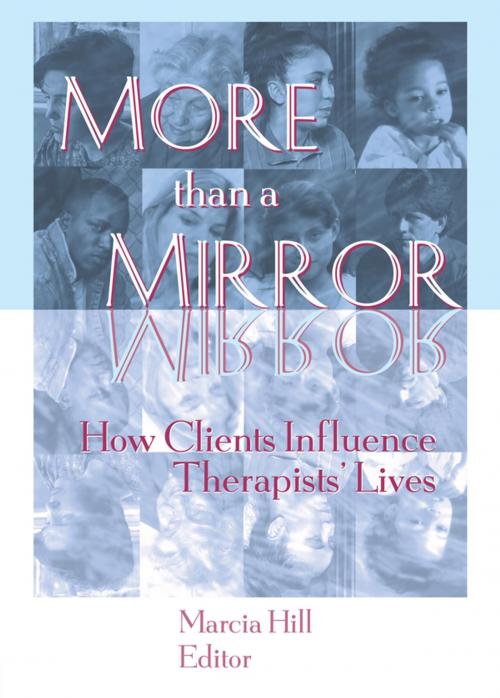More than a Mirror
How Clients Influence Therapists' Lives
Nonfiction, Health & Well Being, Psychology, Mental Health| Author: | Marcia Hill | ISBN: | 9781317993025 |
| Publisher: | Taylor and Francis | Publication: | January 2, 2014 |
| Imprint: | Routledge | Language: | English |
| Author: | Marcia Hill |
| ISBN: | 9781317993025 |
| Publisher: | Taylor and Francis |
| Publication: | January 2, 2014 |
| Imprint: | Routledge |
| Language: | English |
Whether you're a therapist yourself, studying to become a therapist, or simply interested in the mystery that often surrounds therapy, More than a Mirror will show you the rarely discussed, “invisible” side of the therapeutic experience--how clients influence the person of the therapist. In this collection of vignettes and thoughtful explorations, over 20 therapists describe for you how particular clients, issues, and the practice of therapy in general impact them as people.
Writing about therapy is almost universally about how therapists influence clients. In More than a Mirror, therapists describe a range of responses to their work: some talk about what they have learned from particular clients; some discuss aspects of the work of therapy, such as bearing witness to stories of trauma or having to report suspected child abuse, and examine how these experiences affect them personally; and some describe the gifts and costs of doing therapy as a life's work. As you share these therapists’experiences, you'll notice some themes running throughout, including:
-
how doing therapy heals the therapist
-
empathy as a way to access transcendence
-
the therapist's responses to encountering racism
-
the particular struggles of a new therapist
-
the personal toll of working with the dying
-
the therapist's sexual feelings
-
how doing therapy changes the therapist over time
-
the struggles of working with angry or manipulative clients
Editor Marcia Hill, EdD, a psychotherapist in private practice, elaborates, “It is not easy to examine how deeply and personally both the practice of therapy and individual clients influence therapists as people. This book shows you that therapy is not a one-way process, although the therapist is clearly there in service of the client. . . . Yet therapy affects the therapist profoundly and irrevocably. Every client moves us emotionally; we learn something from each person. The business of bearing witness to so many lives transforms us as no other work could. We may write and talk about therapy as if it were all about how to impact the client, but all the time we, too, are being impacted.”
Whether you're a therapist yourself, studying to become a therapist, or simply interested in the mystery that often surrounds therapy, More than a Mirror will show you the rarely discussed, “invisible” side of the therapeutic experience--how clients influence the person of the therapist. In this collection of vignettes and thoughtful explorations, over 20 therapists describe for you how particular clients, issues, and the practice of therapy in general impact them as people.
Writing about therapy is almost universally about how therapists influence clients. In More than a Mirror, therapists describe a range of responses to their work: some talk about what they have learned from particular clients; some discuss aspects of the work of therapy, such as bearing witness to stories of trauma or having to report suspected child abuse, and examine how these experiences affect them personally; and some describe the gifts and costs of doing therapy as a life's work. As you share these therapists’experiences, you'll notice some themes running throughout, including:
-
how doing therapy heals the therapist
-
empathy as a way to access transcendence
-
the therapist's responses to encountering racism
-
the particular struggles of a new therapist
-
the personal toll of working with the dying
-
the therapist's sexual feelings
-
how doing therapy changes the therapist over time
-
the struggles of working with angry or manipulative clients
Editor Marcia Hill, EdD, a psychotherapist in private practice, elaborates, “It is not easy to examine how deeply and personally both the practice of therapy and individual clients influence therapists as people. This book shows you that therapy is not a one-way process, although the therapist is clearly there in service of the client. . . . Yet therapy affects the therapist profoundly and irrevocably. Every client moves us emotionally; we learn something from each person. The business of bearing witness to so many lives transforms us as no other work could. We may write and talk about therapy as if it were all about how to impact the client, but all the time we, too, are being impacted.”















